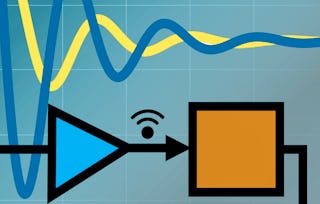In this course, you'll explore modeling of dynamic systems and feedback control. The course begins with an introduction of control theory and the application of Laplace transforms in solving differential equations, providing a strong foundation in linearity, time-invariance, and dynamic system modeling. The following week will delve into the laws governing the modeling of dynamic systems, with a focus on deriving differential equations from fundamental principles like Newton's laws and Kirchhoff's laws, as well as mastering the representation of systems as transfer functions in the Laplace domain. The third week delves deeper into Laplace transforms, emphasizing initial/final value theorems, block diagram manipulation, and dynamic response analysis. Moving into the fourth week, you'll learn to analyze system performance using transient step response specifications, enabling you to assess and optimize system behavior effectively. Finally, in the fifth week, you'll explore Bounded-Input Bounded-Output (BIBO) stability and Routh's stability criterion, gaining the skills to assess, analyze, and design stable systems. By the course's end, you'll be well-equipped to navigate the intricacies of control systems and dynamic modeling.

Control Systems Analysis: Modeling of Dynamic Systems

Control Systems Analysis: Modeling of Dynamic Systems

Dozent: Dr. Lucy Pao
10.801 bereits angemeldet
Bei enthalten
117 Bewertungen
Empfohlene Erfahrung
Was Sie lernen werden
Derive differential equations and transfer functions for simple mechanical, electrical, and electromechanical systems.
Analyze the dynamic response of 1st and 2nd order systems.
Explain the relationship between pole locations of 2nd-order systems and common step response performance specifications.
Characterize Bounded-Input Bounded-Output (BIBO) stability and determine the number of unstable roots using Routh’s stability criterion.
Kompetenzen, die Sie erwerben
- Kategorie: Performance Testing
- Kategorie: Mechanics
- Kategorie: Basic Electrical Systems
- Kategorie: Systems Analysis
- Kategorie: Electrical Systems
- Kategorie: Systems Thinking
- Kategorie: Applied Mathematics
- Kategorie: Engineering Analysis
- Kategorie: Control Systems
- Kategorie: Mathematical Modeling
- Kategorie: Differential Equations
- Der Abschnitt "Fähigkeiten" ist zugeklappt. Zeigt 10 von 11 Fähigkeiten.
Wichtige Details

Zu Ihrem LinkedIn-Profil hinzufügen
11 Aufgaben
Erfahren Sie, wie Mitarbeiter führender Unternehmen gefragte Kompetenzen erwerben.

In diesem Kurs gibt es 5 Module
Welcome to Modeling Feedback Systems. This first week combines the essential concepts of control systems and differential equations. You will explore the foundations of control theory, understand the significance of feedback control, and master the application of Laplace transforms in solving ordinary differential equations. By the end of this week, you will possess a solid understanding of linearity, time-invariance, modeling approaches, and the practical uses of control systems.
Das ist alles enthalten
9 Videos1 Lektüre3 Aufgaben
During the second week of this course, you will delve into the foundational laws used in modeling feedback systems. You will explore how these laws are applied to model simple mechanical, electrical, and electromechanical systems by deriving differential equations from fundamental principles such as Newton's laws of motion, Kirchhoff's laws, and the Motor/Generator laws. Additionally, you will gain proficiency in representing these systems as transfer functions using Laplace and inverse Laplace transforms, which will enable you to analyze and understand their behavior in the frequency domain. By the end of this week, you will have acquired the essential knowledge and skills to effectively model and analyze a wide range of dynamic systems.
Das ist alles enthalten
10 Videos1 Aufgabe
In the third week of this course, you will dive deeper into the application of Laplace transforms. You will start by learning how to use the initial/final value theorems to calculate the values of time-domain signals using their Laplace-domain representation. Additionally, you will develop the skills to manipulate block diagram representations of interconnected systems, enabling you to analyze complex systems and understand their overall behavior. You will also explore the dynamic response of 1st- and 2nd-order systems, gaining insights into their transient and steady-state characteristics. Lastly, you will discover techniques to approximate higher-order systems reasonably well by utilizing the impulse and step responses of lower-order systems. By the end of this week, you will have acquired advanced tools and techniques to analyze and model a wide range of dynamic systems with precision and accuracy.
Das ist alles enthalten
9 Videos2 Aufgaben
In the fourth week of this course, you will focus on system performance analysis using transient step response specifications. You will learn how to calculate and evaluate key performance metrics such as rise time, settling time, and overshoot using the step response of a system. By understanding the relationship between pole locations and step response performance specifications, you will gain insights into how system dynamics affect the overall performance. Furthermore, you will utilize transient step response data to estimate the 2nd-order transfer function approximation, enabling you to model and analyze complex systems accurately. Lastly, you will compare the impact of zeros and additional poles on the step responses of systems, deepening your understanding of how system components influence the overall behavior. By the end of this week, you will be equipped with the skills to assess and optimize system performance based on transient step response characteristics.
Das ist alles enthalten
12 Videos2 Aufgaben
Congratulations on making it to the 5th and final week of this course. This week you will delve into the concept of Bounded-Input Bounded-Output (BIBO) stability and its application in analyzing Linear Time-Invariant (LTI) systems. You will learn the necessary and sufficient conditions for BIBO stability and apply them to assess the stability of dynamic systems. Additionally, you will explore Routh's stability criterion, which allows you to determine system stability. Furthermore, you will discover how to design stable proportional-feedback systems using Routh's stability criterion, enabling you to create control systems that exhibit desirable behavior. By the end of this week, you will have acquired the knowledge and skills to analyze, assess, and design stable systems using BIBO stability and Routh's stability criterion.
Das ist alles enthalten
10 Videos3 Aufgaben
Auf einen Abschluss hinarbeiten
Dieses Kurs ist Teil des/der folgenden Studiengangs/Studiengänge, die von University of Colorado Boulderangeboten werden. Wenn Sie zugelassen werden und sich immatrikulieren, können Ihre abgeschlossenen Kurse auf Ihren Studienabschluss angerechnet werden und Ihre Fortschritte können mit Ihnen übertragen werden.¹
Dozent

Mehr von Electrical Engineering entdecken
 Status: Kostenloser Testzeitraum
Status: Kostenloser TestzeitraumUniversità di Napoli Federico II
 Status: Kostenloser Testzeitraum
Status: Kostenloser Testzeitraum Status: Vorschau
Status: VorschauUniversità di Napoli Federico II
Warum entscheiden sich Menschen für Coursera für ihre Karriere?

Felipe M.

Jennifer J.

Larry W.

Chaitanya A.
Bewertungen von Lernenden
- 5 stars
75,21 %
- 4 stars
19,65 %
- 3 stars
3,41 %
- 2 stars
0 %
- 1 star
1,70 %
Zeigt 3 von 117 an
Geprüft am 19. März 2024
Fairly good class. Students with experience in diff eqs should find it challenging. I would recommend creating extra material in using software like Mathematica or Matlab to help solve problems.
Geprüft am 24. Apr. 2025
The most amazing and useful material i could find
Geprüft am 26. Okt. 2025
in the course, some questions were hard to understand. For future courses if possible, add conceptual hints for solving the problems.

Neue Karrieremöglichkeiten mit Coursera Plus
Unbegrenzter Zugang zu 10,000+ Weltklasse-Kursen, praktischen Projekten und berufsqualifizierenden Zertifikatsprogrammen - alles in Ihrem Abonnement enthalten
Bringen Sie Ihre Karriere mit einem Online-Abschluss voran.
Erwerben Sie einen Abschluss von erstklassigen Universitäten – 100 % online
Schließen Sie sich mehr als 3.400 Unternehmen in aller Welt an, die sich für Coursera for Business entschieden haben.
Schulen Sie Ihre Mitarbeiter*innen, um sich in der digitalen Wirtschaft zu behaupten.
Häufig gestellte Fragen
To access the course materials, assignments and to earn a Certificate, you will need to purchase the Certificate experience when you enroll in a course. You can try a Free Trial instead, or apply for Financial Aid. The course may offer 'Full Course, No Certificate' instead. This option lets you see all course materials, submit required assessments, and get a final grade. This also means that you will not be able to purchase a Certificate experience.
When you enroll in the course, you get access to all of the courses in the Specialization, and you earn a certificate when you complete the work. Your electronic Certificate will be added to your Accomplishments page - from there, you can print your Certificate or add it to your LinkedIn profile.
Yes. In select learning programs, you can apply for financial aid or a scholarship if you can’t afford the enrollment fee. If fin aid or scholarship is available for your learning program selection, you’ll find a link to apply on the description page.
Weitere Fragen
Finanzielle Unterstützung verfügbar,


